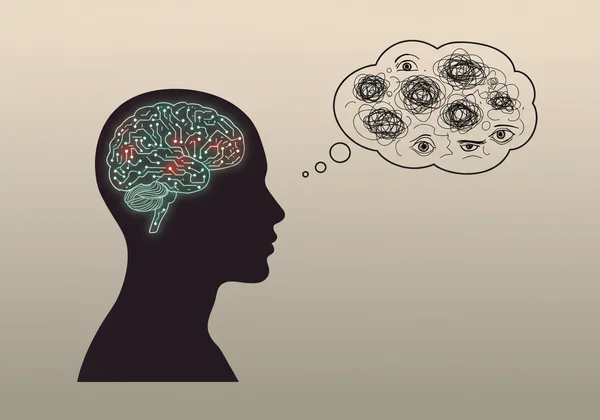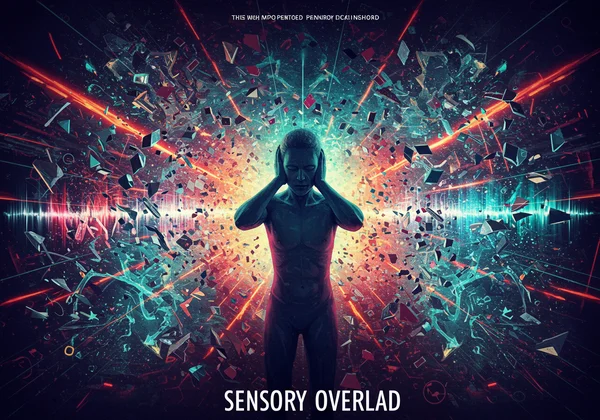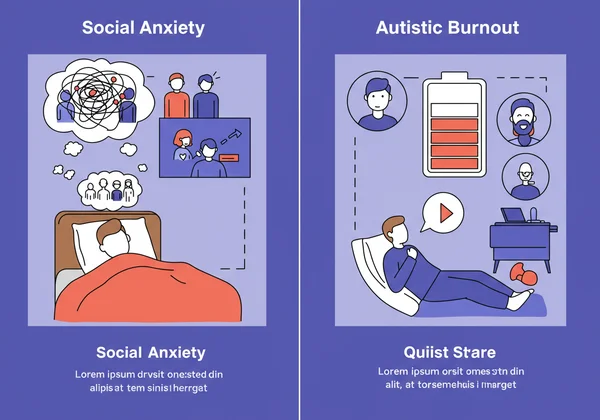Autism vs. Social Anxiety: When to Take an Autism Spectrum Test
August 17, 2025 | By Leo Whitaker
Do you find social gatherings draining? Is it a fear of being judged, or is it the sheer exhaustion of trying to navigate unwritten social rules? Many adults grapple with this question, wondering if their social challenges stem from autism vs. social anxiety. This guide is here to help you understand the crucial differences and overlaps, offering clarity on your journey of self-discovery. If you've ever asked yourself, "am I autistic or just socially awkward?", you are not alone, and exploring these feelings is the first step toward greater self-awareness.
The confusion is understandable because both autistic individuals and those with social anxiety can find social situations challenging. However, the underlying reasons for these challenges are fundamentally different. Understanding these core motivations can be incredibly empowering. It can shift your perspective from "what's wrong with me?" to "how does my brain work?" To begin this exploration, you might consider an online autism screening as a tool for personal insight.

What Are the Key Signs of Autism in Adults?
Autism Spectrum Disorder (ASD) is a neurodevelopmental condition, meaning the brain develops and processes information differently. It's not a disease or a deficit, but a unique way of experiencing the world. In adults, especially those who went undiagnosed in childhood, the signs can be nuanced. They've often spent a lifetime developing coping mechanisms or "masking" their traits to fit in.
Social Communication and Interaction Challenges
This is a core characteristic of autism, but it's not about being "unfriendly." It's more about a different communication style. An autistic adult might find it difficult to interpret non-verbal cues like body language, facial expressions, or tone of voice. Small talk can feel pointless and confusing, while they might excel at deep, focused conversations about their passions. They may not initiate or maintain back-and-forth conversation in a way that neurotypical people expect.
Repetitive Behaviors and Special Interests (Stimming)
Repetitive movements or behaviors, often called stimming, are common and serve as a self-regulating mechanism. This can include hand-flapping, rocking, or fidgeting to manage sensory input or anxiety. Another key trait is having deep, highly focused special interests. An autistic person might develop an encyclopedic knowledge of a specific topic, finding immense joy and comfort in learning everything they can about it. These interests are a significant part of their identity, not just casual hobbies.
Sensory Sensitivities (Overload and Under-stimulation)
The world can be a very intense place for an autistic individual. Sensory sensitivities mean they may be hypersensitive (over-responsive) or hyposensitive (under-responsive) to sights, sounds, smells, tastes, or textures. A crowded supermarket with its bright lights, beeping checkouts, and multiple conversations can cause sensory overload, leading to exhaustion and a need to withdraw. Conversely, they might seek out strong sensory input, like loud music or spicy food.

Difficulties with Executive Functioning
Executive functions are the mental skills we use to get things done: planning, organizing, starting tasks, and regulating emotions. Autistic adults may struggle with these skills. This can manifest as difficulty managing time, transitioning between activities, or feeling overwhelmed by tasks with many steps. It can also contribute to challenges with emotional regulation, where feelings can become intensely overwhelming very quickly.
Understanding Social Anxiety Disorder
Social Anxiety Disorder, also known as social phobia, is an anxiety disorder characterized by an intense and persistent fear of being watched and judged by others. This fear can affect work, school, and other day-to-day activities. Unlike the neurological differences in autism, social anxiety is rooted in fear.
The Core Driver: An Intense Fear of Judgment
The defining feature of social anxiety is a powerful fear of negative evaluation. A person with social anxiety is preoccupied with the worry that they will act in a way that is embarrassing or humiliating. They fear they will say the wrong thing, that people will notice their anxiety, or that they will be rejected by the group. This fear is the primary motivator behind their avoidance of social situations.

Physical Symptoms of Anxiety
This intense fear often triggers a physical "fight or flight" response. When faced with a social situation, a person may experience blushing, profuse sweating, trembling, a rapid heart rate, or feeling like their mind has gone blank. These physical symptoms can be distressing and can, in turn, increase the fear of being judged, creating a vicious cycle.
Avoidance of Social Situations
To prevent the distress caused by this fear, people with social anxiety often go to great lengths to avoid triggering situations. They might turn down party invitations, avoid speaking up in meetings, eat lunch alone, or dread making phone calls. While this avoidance provides temporary relief, it ultimately reinforces the fear and can lead to significant isolation.
Am I Autistic or Socially Awkward? A Direct Comparison
This is the central question. While both can lead to social avoidance, the "why" is the key differentiator. Let's break it down into common scenarios to highlight the difference.
Motivation: Fear of Judgment vs. Sensory Overload
Imagine being invited to a loud, crowded party. The person with social anxiety might decline because they are terrified of being judged. What if I don't know anyone? What if I say something stupid? Everyone will think I'm weird. The motivation is external: a fear of others' negative perceptions. The autistic person might decline because the thought of the loud music, flashing lights, and unpredictable hum of conversations is exhausting. The motivation is internal: a need to avoid the pain and burnout of sensory overload. They may be perfectly happy to interact with the same people in a quiet, one-on-one setting.
Social "Mistakes": Worrying About Saying the Wrong Thing vs. Not Knowing the "Rule"
After a conversation, the person with social anxiety might ruminate for hours, replaying every word. Did I talk too much? Was that joke offensive? They probably think I'm an idiot. They generally know the social rules but fear they have broken them. The autistic person might be confused about why the interaction felt "off." They may have unintentionally broken an unspoken social rule they didn't know existed, such as monologuing about a special interest or being too direct. The feeling is less about shame and more about confusion and frustration with a social world that feels arbitrary.
After the Event: Ruminating on Performance vs. Recovering from Social Burnout
The post-social experience is also telling. The individual with social anxiety replays the event to scrutinize their social "performance." In contrast, the autistic individual often experiences a "social hangover" or autistic burnout. This is a profound state of exhaustion caused by the cognitive effort of masking autistic traits, processing sensory information, and consciously performing neurotypical social behaviors. It's not about what others thought; it's about recovering the massive amount of energy spent just to participate. If this resonates with you, taking a free autism test can be a helpful step.

The Critical Overlap: Can You Have Both?
Yes, absolutely. This is a crucial point that adds to the confusion. Many autistic people develop social anxiety as a result of their autistic traits. After years of social interactions feeling confusing, difficult, or leading to negative reactions from others, it is perfectly logical to develop a fear of them. However, treating only the social anxiety won't address the underlying autistic neurology. Understanding if autism is at the root is key to finding the right support and self-acceptance. A confidential test can provide the initial insights needed to untangle these experiences.
Your Path to Understanding and Self-Discovery
Distinguishing between autism and social anxiety is a journey into the "why" behind your social experiences. Is the primary driver a fear of judgment (social anxiety), or is it a combination of sensory overload, communication differences, and social burnout (autism)? Understanding this difference is not about labeling yourself but about empowering yourself with the right language and tools for self-compassion and growth.
This guide is for informational purposes and is not a substitute for a professional diagnosis. However, your self-exploration is valid and important. Feeling that some of these autistic traits resonate? The first step to clarity is insight. Take our free autism spectrum test to explore your traits further in a confidential, science-based environment.
Frequently Asked Questions
Is an online autism test accurate?
Online tests, like the ones based on the AQ-10 or AQ-50, are best understood as screening tools, not diagnostic instruments. They are designed to identify traits associated with autism and can be a highly valuable first step. A high score suggests that further exploration with a qualified professional may be beneficial, but it does not equal a formal diagnosis. Their accuracy lies in their ability to provide personal insight and guide your next steps.
What are the 5 main symptoms of autism?
Autism is a spectrum, so it presents differently in everyone. However, the core areas of difference are often grouped into: 1) challenges with social communication and interaction, 2) restricted and repetitive behaviors or interests (including stimming), 3) sensory sensitivities (either hyper- or hypo-), 4) a preference for routine and predictability, and 5) difficulties with executive functioning.
How do I get a formal autism diagnosis?
Getting a formal diagnosis as an adult typically starts with speaking to your primary care physician or a mental health professional. They can refer you to a psychologist or psychiatrist who specializes in adult autism assessments. The process often involves detailed interviews about your developmental history, questionnaires, and direct observation to make a comprehensive evaluation.
Am I autistic or just socially awkward?
This is a question many people ask. "Socially awkward" is a broad term, but it often aligns more with the experience of social anxiety—knowing the rules but feeling anxious about executing them. Autism is a fundamental difference in how you process the world and social information. If social situations are confusing and exhausting on a sensory and cognitive level, rather than just scary, it may be valuable to explore your traits with a screening tool.